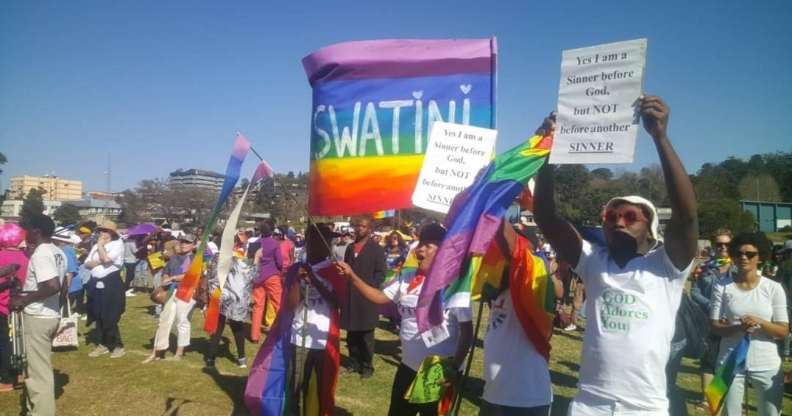Swaziland held its first Pride parade despite homosexuality being illegal – and it was amazing

Attendees enjoy eSwatini’s first Pride (yasemahozenimnd/twitter)
Swaziland has celebrated its first ever Pride parade, defying a national ban on homosexuality.
Around 500 people marched along the streets of Mbabane, the capital of Swaziland – which renamed itself eSwatini earlier this year – despite fears of a violent backlash.
A Pride event held at Kenya’s Kakuma refugee camp in June led to LGBT refugees being attacked and sent death threats, but Melusi Simelane, who represents Swazi LGBT advocacy group The Rock of Hope, said intimidation would not stop them.

People take part in eSwatini’s first Pride (MONGI ZULU/AFP/Getty)
He told The Daily Beast that even though he had received “threats to the safety” of participants, it was crucial to go ahead with the march.
“This is the first event of its kind, our first opportunity to show our faces to the world and to our country,” Simelane said.
“I am not scared.”
And it seems that attendees took these words to heart, holding Pride flags high as they paraded through the capital on June 30.

Around 500 people marched along the streets of Mbabane (MONGI ZULU/AFP/Getty)
Matt Beard, the executive director of LGBT organisation All Out, wrote on Medium that “the community and their allies painted the streets of this country rainbow, with a beautiful, colourful parade that was literally exploding with joy.
“At certain moments,” he said, “the infectious joy of this community was so intense, it was difficult to hold back the tears. We were loud, proud and dignified.”
And, Beard said, concerns that there would be a visible, negative response to the parade proved unfounded.

“We were loud, proud and dignified” (ngimlona/twitter)
“Nobody came to hurl hate, abuse (or worse) at us, as had been feared,” he reported. “Instead, this was a moment of community and personal empowerment.
“A powerful boost to so many who have had to hide in the shadows, but who today experienced the giddy excitement of visibility and deep community.”
Beard said that he thought the parade would have a ripple effect felt all over Africa.

The parade, it is hoped, will help change attitudes around the continent (yasemahozenimnd/twitter)
“The success of today’s event will also be an inspiration to LGBT+ groups across this continent,” he wrote.
“It will empower other African movements to defy those who wish to silence LGBT+ people and embolden them to come out on the streets in pride and courage.”
Despite facing threats and a ban from the Turkish Government, Istanbul’s Pride parade also went ahead over the weekend.

Activists take part in the Pride march in Istanbul (BULENT KILIC/AFP/Getty)
The event has been banned for four consecutive years, despite homosexuality not being illegal in Turkey. Each year, organisers and participants have proceeded anyway, despite threats and arrests.
And in much less dramatic circumstances, Helsinki Pride also took place on June 30, with a record 100,000 people estimated to have marched in the parade.
Helsinki Police posted on Twitter that there were no incidents at the event.

